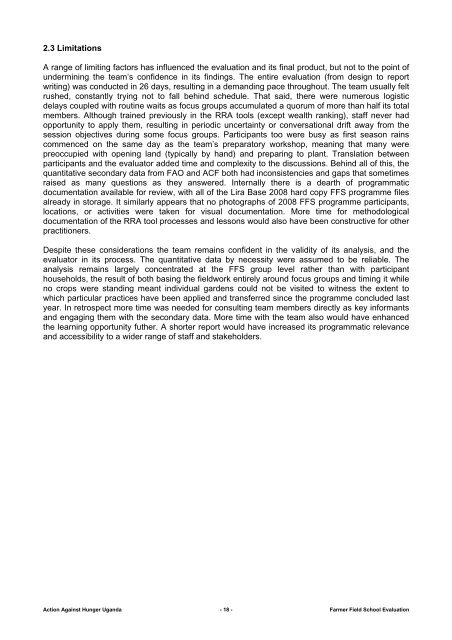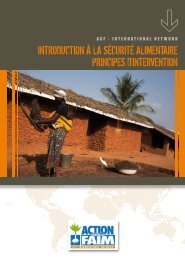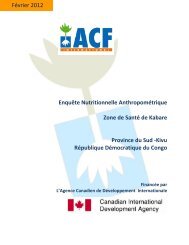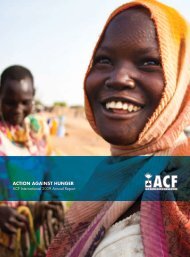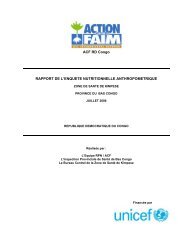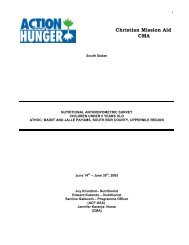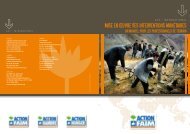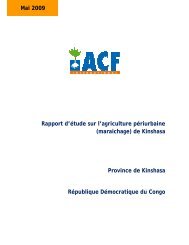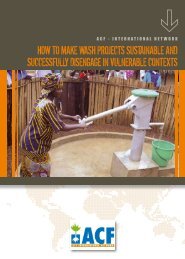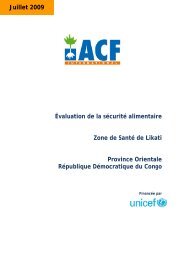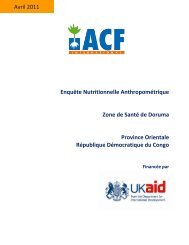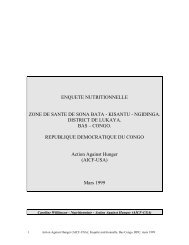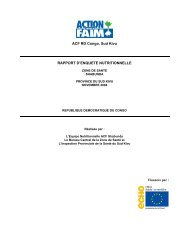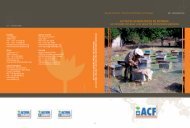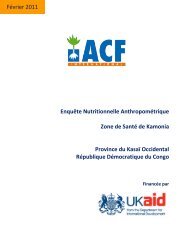Participatory Evaluation of our 2008 - Action Against Hunger
Participatory Evaluation of our 2008 - Action Against Hunger
Participatory Evaluation of our 2008 - Action Against Hunger
You also want an ePaper? Increase the reach of your titles
YUMPU automatically turns print PDFs into web optimized ePapers that Google loves.
2.3 Limitations<br />
A range <strong>of</strong> limiting factors has influenced the evaluation and its final product, but not to the point <strong>of</strong><br />
undermining the team’s confidence in its findings. The entire evaluation (from design to report<br />
writing) was conducted in 26 days, resulting in a demanding pace throughout. The team usually felt<br />
rushed, constantly trying not to fall behind schedule. That said, there were numerous logistic<br />
delays coupled with routine waits as focus groups accumulated a quorum <strong>of</strong> more than half its total<br />
members. Although trained previously in the RRA tools (except wealth ranking), staff never had<br />
opportunity to apply them, resulting in periodic uncertainty or conversational drift away from the<br />
session objectives during some focus groups. Participants too were busy as first season rains<br />
commenced on the same day as the team’s preparatory workshop, meaning that many were<br />
preoccupied with opening land (typically by hand) and preparing to plant. Translation between<br />
participants and the evaluator added time and complexity to the discussions. Behind all <strong>of</strong> this, the<br />
quantitative secondary data from FAO and ACF both had inconsistencies and gaps that sometimes<br />
raised as many questions as they answered. Internally there is a dearth <strong>of</strong> programmatic<br />
documentation available for review, with all <strong>of</strong> the Lira Base <strong>2008</strong> hard copy FFS programme files<br />
already in storage. It similarly appears that no photographs <strong>of</strong> <strong>2008</strong> FFS programme participants,<br />
locations, or activities were taken for visual documentation. More time for methodological<br />
documentation <strong>of</strong> the RRA tool processes and lessons would also have been constructive for other<br />
practitioners.<br />
Despite these considerations the team remains confident in the validity <strong>of</strong> its analysis, and the<br />
evaluator in its process. The quantitative data by necessity were assumed to be reliable. The<br />
analysis remains largely concentrated at the FFS group level rather than with participant<br />
households, the result <strong>of</strong> both basing the fieldwork entirely around focus groups and timing it while<br />
no crops were standing meant individual gardens could not be visited to witness the extent to<br />
which particular practices have been applied and transferred since the programme concluded last<br />
year. In retrospect more time was needed for consulting team members directly as key informants<br />
and engaging them with the secondary data. More time with the team also would have enhanced<br />
the learning opportunity futher. A shorter report would have increased its programmatic relevance<br />
and accessibility to a wider range <strong>of</strong> staff and stakeholders.<br />
<strong>Action</strong> <strong>Against</strong> <strong>Hunger</strong> Uganda - 18 - Farmer Field School <strong>Evaluation</strong>


